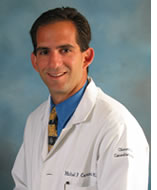

 |
Michael P. Carson, M.D., is an Obstetric
Internist and Director of Obstetric Medicine for the Comprehensive Care
Group in New Brunswick, NJ, as well as Chief of the Division of General
Internal Medicine at St. Peter's University Hospital. He is also an Assistant
Clinical Professor of Medicine and an Assistant Clinical Professor of
Obstetrics, Gynecology & Reproductive Sciences at UMDNJ's Robert Wood
Johnson Medical School. Dr. Carson is board certified in internal medicine
and graduated from Temple University School of Medicine. His training
in Internal Medicine and his fellowship in Obstetric Medicine were both
at Brown University School of Medicine. For more information on Dr. Carson,
please visit http://tinyurl.com/michaelcarsonmd.
|

What is Gestational Diabetes?
The body breaks down food into glucose which is then used as an energy supply.
A hormone called insulin helps change glucose into energy.
As the pregnancy progresses, the hormones of pregnancy limit the effect of
insulin in the body. About 3% of women who become pregnant develop "temporary"
or "gestational" diabetes because the pancreas (where insulin is produced" is
unable to keep up with the increased demand. This allows the amount of sugar
in the blood to be too high. This is why most pregnant women are given a 1-hour
"sugar" or "glucose tolerance test". If the 1-hour test is abnormal, then you
are asked to take the more accurate 3-hour test.
My sugar test was high, what next?
This is not an emergency. The first step is to become educated about gestational
diabetes. You will be referred to a clinical nutritionist who will teach you
about the diet and how to monitor your blood sugars. About a week after these
visits you will meet with a physician to review your blood sugar results. Not
everyone requires medication to control their sugars. The first step is following
a diet.
Can this affect my fetus?
Some of this excess sugar in the blood moves across the placenta to the baby,
which may increase the risk for certain complications. After birth, the baby
can develop low blood sugar since his or her body is used to producing extra
insulin and it may take a while for it to adapt to the need for less insulin.
The best way to avoid complications is to follow the diet, monitor your blood
sugar (usually 4 times a day), and maintain close communication with your obstetrician,
obstetric internist, and diabetes team.
What can I expect during the pregnancy?
You may have to visit the doctor more often throughout the pregnancy than women
without diabetes. Don't be alarmed if your doctor orders blood tests to check
your kidney function, and non-stress tests or ultrasound exams to evaluate the
condition of the baby and the placenta.
You may be asked to keep track of the baby's movements several times each day.
Again, check your blood sugar at least 4 times a day (or more if ordered by
your doctor) to be sure it stays at a safe level. Eat regularly. Don't skip
meals.
After Pregnancy:
Gestational diabetes can predict the onset of diabetes later in life. Your
medical doctor should check your sugar 4 to 6 months after delivery and then
about every 2 years. Early recognition and treatment will decrease your risk
of any complications.
Click here for related information.

Created: 11/12/2000 - Michael Carson, M.D.



